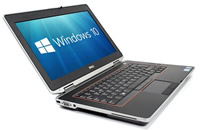When choosing a laptop remember that while upgrades are possible (unlike most tablets) they are more difficult to apply to a laptop that a desktop so be clear what you want before you purchase:
- Bigger screen size can provide a better computing experience, but results in a larger, heavier machine. If your lifestyle requires a PC that you want to use it on the daily train commute, maybe smaller is better.
- Keyboard layouts are not quite as standard as you may think. The larger laptops offer numeric keypads, a must for some people working in the financial sectors. Others offer backlit keys, very useful if you want to use the laptop in darkened rooms.
- Many laptops these days save bulk by not having a DVD Player. While most media is now available via download this can be irritating if you want to load your favourite software or Music CD.
- Many people dislike using touch pads, preferring to carry a mouse with them. It can be worth taking the time to get comfortable with the touchpad. An alternative is a touch screen but if you go that route consider investing in a stylus as small screens and big fingers don't compliment each other.
- A docking station either at home, in the office, or both can turn your laptop into a full multimedia PC with all the benefits of a full desktop.
- Get the right hard drive. Estimate the space you are likely to require and then add a bucket load. Solid state drives (SSDs) are more expensive than traditional Hard disk drives (HDDs) but are generally more robust and load faster.
 General
Cloud
Servers
Desktops
Laptops
Tablets
Smartphones
Networks
IP Telephony
MS Windows
MS Office
Domain Names
General
Cloud
Servers
Desktops
Laptops
Tablets
Smartphones
Networks
IP Telephony
MS Windows
MS Office
Domain Names
William Dean Consultancy ltd.
Making IT Work since 1985

© 2016 William Dean Consultancy ltd.
01635 202267